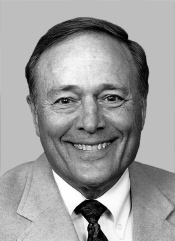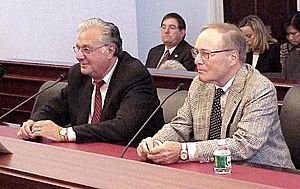Bill Archer facts for kids
Quick facts for kids
Bill Archer
|
|
|---|---|
 |
|
| Chair of the House Ways and Means Committee | |
| In office January 3, 1995 – January 3, 2001 |
|
| Preceded by | Sam Gibbons |
| Succeeded by | Bill Thomas |
| Member of the U.S. House of Representatives from Texas's 7th district |
|
| In office January 3, 1971 – January 3, 2001 |
|
| Preceded by | George H. W. Bush |
| Succeeded by | John Culberson |
| Member of the Texas House of Representatives from the 22nd district Seat 5 |
|
| In office January 10, 1967 – January 12, 1971 |
|
| Preceded by | Wallace Miller |
| Succeeded by | Seat abolished |
| Personal details | |
| Born |
William Reynolds Archer Jr.
March 22, 1928 Houston, Texas, U.S. |
| Political party | Democratic (before 1967) Republican (1967–present) |
| Spouse | Sharon Sawyer |
| Education | Rice University University of Texas, Austin (BBA, LLB) |
| Military service | |
| Branch | |
| Service years | 1951–1953 |
| Rank | Captain |
| Conflict | Korean War |
William Reynolds Archer Jr. (born March 22, 1928) is an American retired lawyer and politician. He served in the Texas House of Representatives from 1967 to 1971. During this time, he changed from the Democratic Party to the Republican Party. Later, he represented Texas in the United States House of Representatives as a Republican for 30 years, from 1971 to 2001. For his last six years, he was the chairman of the important House Ways and Means Committee.
Contents
Early Life and Education
William Archer was born in Houston, Texas. He went to St. Thomas High School. After high school, he attended Rice University. He then transferred to the University of Texas at Austin. There, he earned degrees in business and law.
After finishing law school in 1951, Archer became a lawyer in Houston. A few months later, he joined the United States Air Force. He served as a captain during the Korean War. When he returned from service in 1953, Archer became the president of a company called Uncle Johnny Mills, Inc. He worked there until 1963.
Starting a Political Career
Archer began his political journey early on. From 1955 to 1962, he served as a councilman and mayor pro tempore for Hunters Creek Village. In 1967, he became a member of the Texas House of Representatives.
Later that same year, he was elected to the United States House of Representatives. He took over the seat from George H. W. Bush, who later became president. Archer won his first election with 65% of the votes. He was reelected 14 times and often faced little competition. His lowest winning percentage was in 1970. In some elections, like 1976, 1990, 1992, and 1994, he ran without any opponents.
Leading the Ways and Means Committee
From 1995 until he retired in 2001, Archer was the chairman of the House Committee on Ways and Means. This committee is very powerful because it handles tax laws and other money-related issues for the government.
As chairman, he was known for being a "tough fiscal conservative." This means he believed the government should spend less money and take less in taxes from citizens. He wanted to reduce the size of government by lowering taxes. This idea is sometimes called "starving the beast."
Archer decided not to run for reelection in 2000. He retired from politics on January 2, 2001.
Views on Important Issues
William Archer held views that are considered politically and socially conservative. He supported the death penalty. He also opposed adoption by same-sex couples. He called for cuts in government funding for social programs.
In 1999, Archer played a key role in giving temporary "Most favoured nation" (MFN) status to China. This was done with the support of then-President Bill Clinton. There were concerns about human rights in China and the trade balance. In 2000, Archer introduced a bill to make China's trade status with the U.S. permanent. This bill aimed to help American farmers by giving them access to China's large market.
Life After Politics

After retiring from politics in 2001, Archer remained involved in public life. He was considered as a possible replacement for the Treasury Secretary in 2002.
A special program at the University of Texas System is named after him: the Archer Fellowship Program. This program allows students from the UT System to study and intern in Washington, D.C. He also served as chairman of the International Conservation Caucus Foundation from 2006 to 2009. Today, he works as a Senior Policy Analyst at PricewaterhouseCoopers and sometimes gives lectures.
See also
- List of American politicians who switched parties in office
 | Toni Morrison |
 | Barack Obama |
 | Martin Luther King Jr. |
 | Ralph Bunche |

